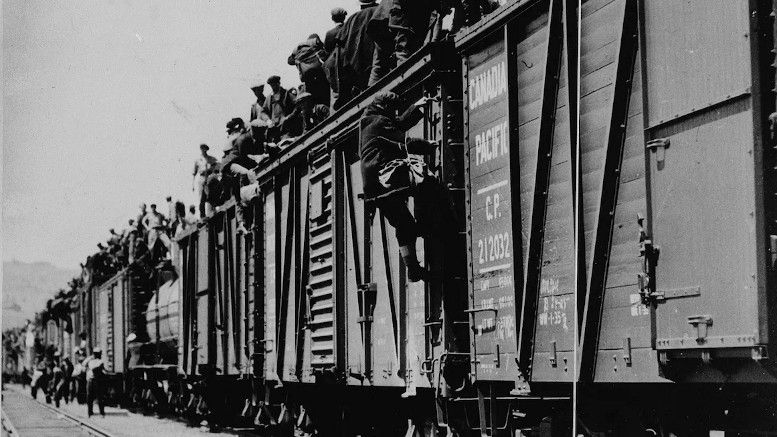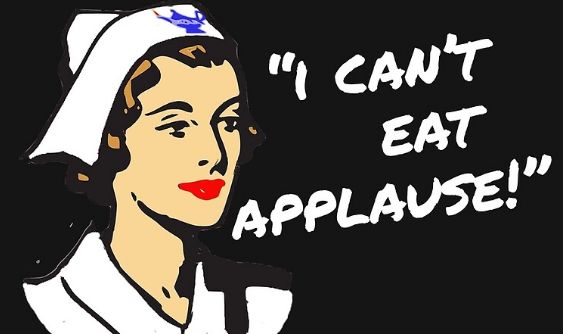Now that the convoy has been cleared from Ottawa’s streets, it is worth remembering when desperate workers tried to take their protest to the federal government in Ottawa in 1935. The “On to Ottawa Trek” saw unemployed men housed in military relief camps travel by rail from Vancouver, stopping at towns along the way gaining widespread support and more participants. Unlike the recent convoy, the federal government unleashed a brutal assault on them by the RCMP at Regina.
The Great Depression of the 1930s devastated Canada much like the rest of the world. In four years, from 1929 to 1933, total public and private spending fell by 42 percent and by 1933 unemployment was at 30 percent. The prairies were hit especially hard, as alongside the economic collapse there was a disastrous drought.
The first drought occurred in 1929, and by 1931 parts of Saskatchewan had experienced three consecutive crop failures. By August 1931, the Canadian Red Cross launched an appeal for food and clothing for farmers hit by this catastrophe. Rain fell in the spring of 1933 and the crop started well, only to be destroyed by grasshoppers. The price of the wheat that was grown plummeted from $1.03 in 1928 to a mere 29 cents in 1932. Farming income collapsed from $363 million in 1928 to only $11 million by 1933. Two-thirds of the rural population was destitute, forced to rely on pathetic relief. The fall in prices had a multiplier effect, many abandoned their farms for the cities. When federal relief was offered the threat of deportation was also deliberately used to scare away, if not discourage, relief applicants. In Saskatchewan, for example, destitute foreigners were required to sign a form agreeing to voluntary deportation at any future time before relief was granted. Winds blew away the soil and the depression was known as The Dirty Thirties.
The desperation of the 1930s provoked deep questioning of the capitalist system and a renewed interest in socialism. The Russian Revolution of 1917 had inspired workers around the world, including in Canada, culminating in the 1919 Winnipeg General Strike. The ruling class of Canada succeeded in pushing back the young Communist Party, in the 1920s (aided by deep internal divisions that saw most of the early members either be expelled or leave).
In response to the mass unemployed protesting in cities across Canada, Prime Minister R.B. Bennett created a nationwide system of camps to house and provide work for single, unemployed, homeless Canadian males. This was more to get these men away from the cities and hide what he saw as the problem. Conditions were exemplified by Project 51, described as “Canada’s gulag,” in the Lac Seul district of northwestern Ontario, where some two thousand men spent several miserable months, knee-deep in muskeg or snow, clearing the marketable timber from along fourteen hundred miles of shoreline. This menial labour was rewarded with 20 cents a day. “We were slaves,” a former camper bitterly complained. “What else would you call a man who is given twenty cents a day and is expected to believe their bullshit that he is an important part of the country?”
The Communist Party, through the Worker’s Unity League (WUL), established the Relief Camp Workers Union in 1934. Over the four years of the federal relief camps, there were “359 recorded strikes, riots, demonstrations, and disturbances in all projects across Canada.” Since the union was established by the WUL, they used their experience in organizing the unemployed in urban centres and applied it to the camps. The WUL sent agitators to the camps to help spread ideas and literature to increase the likelihood of these men joining the cause.
One of these was Arthur “Slim” Evans, the BC organizer for the WUL. He had lived his life in the worker’s movement; as a fellow comrade said, “Nothing outside of working-class struggle held any interest for him.” Born in Toronto, he became involved in radical labour activity in the US Midwest. In 1913, during the lengthy Ludlow, Colorado miners’ strike, he was wounded in the leg by a machine gun bullet fired by National Guard and thereafter walked with a pronounced limp. In 1919, he returned to Canada and was involved in the One Big Union. In 1923 he was falsely charged with theft of union dues after using the money for local relief in Drumheller and was sentenced to three years in the Saskatchewan penitentiary; a petition from the miners he supposedly robbed secured his early release.
Evans moved to British Columbia in 1926, the same year he joined the Communist Party. He tirelessly worked for the WUL, trying to organize fishermen, miners, relief camp workers, and any other disaffected group that would listen. By 1932, Evans’s movements and his speeches were constantly being monitored by police. “This man seems to be establishing himself as quite a danger,” complained the commissioner of the BC Provincial Police.
In April 1935, strikes broke out in the camps in BC and the strikers headed for Vancouver. Soon there was over a thousand, organized into four divisions of about four hundred men each. Several representatives from each division made up a central strike committee, while a smaller strategy committee decided policy. There was also a publicity committee and several other subcommittees. As Steve Brodie, one of the leaders of division three, later remarked, “We had committees for everything. We couldn’t slice a loaf of bread into five bologna sandwiches without appointing a committee to see it was done according to plan. Discipline was an absolute must.” This strong sense of community gave the hundreds of men a new-found meaning in their lives.
The immense solidarity from the people of Vancouver was demonstrated on Saturday, April 13, when an incredible $5,500 was collected on the streets. The May Day parade that year had 20,000 people: strikers and supporters.
The idea to take their grievances to Ottawa is attributed to a nameless striker who stood up at a special meeting and said, “Let us go to them.” This idea was quickly embraced. “The strikers were very enthusiastic,” Evans later recounted. “If applause would do it, they would have taken off the roof of the building.” About 1,000 strikers headed for Ottawa. The strikers’ demands were: wages of 50 cents an hour for unskilled work, union wages for skilled; at least 120 hours of work a month; the provision of adequate first aid equipment in the camps; the extension of the Workmen’s Compensation Act to include camp workers; recognition of democratically elected workers’ committees; and that workers in camps be granted the right to vote in elections.
The trekkers travelled by rail on boxcars, allowed on by CPR workers who looked the other way, through Kamloops, Golden, Calgary, Medicine Hat, Swift Current and Moose Jaw. At each city they grew in numbers, with crowds waiting to show solidarity with food, drink, and songs. The trekkers became a beacon for the oppressed throughout Canada, putting to bed the propaganda that this was all a “communist plot.” With the mix of European languages, Protestants and Catholics, were descendants of the Chinese immigrants who were worked to death on the same rail lines. At least a handful of Indigenous peoples were also on the trek.
By the time the trek reached Regina, the federal government had decided that it must end, by any means necessary. While the main group rested at Regina stadium, a delegation of leaders was invited to meet with the Prime Minister to give their demands. Although they were sure this was a trap, they decided to play along, so a delegation of eight, including Slim Evans, went to Ottawa. Bennett sat in the middle on one side of the conference table wearing a swallowtail waistcoat and a winged collar, with a diamond stick pin in his tie. The separation of the two groups was both real and symbolic, glaring at each other from across the room.
Bennett went straight into an attack, saying the government had taken care of the unemployed and that any other opinion was the work of communist propaganda. He then stuffily remarked “Now you ask for work.… You have not shown much anxiety to get work, …What you want is this adventure in the hope that the organization which you are promoting in Canada may be able to overawe the Government and break down the forces that represent law and order.” Evans swiftly replied, “You referred to us as not wanting work. Give us work and we will see whether we will work.… Anybody who professes to be premier and uses such despicable tactics is not fit to be premier of a Hottentot village.” Bennett replied, “I come from Alberta. I remember when you embezzled the funds of your union and were sent to the penitentiary.” “You are a liar,” shot back Evans, “I was arrested for fraudulently converting those funds to feed the starving and … if you say I embezzled … I will have the pleasure of telling the workers throughout Canada I was forced to tell the premier of Canada he was a liar.… You are not intimidating me a damned bit.”
“No young men have been better treated in better circumstances than these camps provide,” he told the delegates. “Everyone knows that.” This nonsense had Paddy O’Neill on his feet, arguing with the prime minister, but Evans stopped him realizing that there was no point interrupting anymore. The delegates returned to Regina knowing that the city police, the RCMP and the military were ready to stop them by any means. Bennett had stated this, but they were not intimidated. On July 1, 1935, Dominion Day, the trekkers gathered for the last time to protest in Regina town square.
The city police sprang from their hiding place and charged the speaker’s platform, driving into the crowd. Staff Inspector McDougall, who led the police waving his baton in a sweeping motion, shouted at the people to step aside. Many were too shocked to move. “I looked in their faces,” John McCarthy recalled, “and I never saw such fear depicted on human beings as on those faces.” Others remembered the two-foot long “white” clubs the police wielded. The attack caught the people off guard before their anger took over. They fought back with sticks, stones, and anything at hand. Mounted RCMP officers then started to use tear gas and fired guns. When it was over, 140 trekkers and citizens had been arrested. Charles Miller, a plainclothes police officer, died and Nick Schaack, a trekker, later died in the hospital from injuries. Trekkers Arthur Evans and George Black who were on the speakers’ platform were arrested by plainclothes police at the beginning of the melee.
Once the hearings, trials, and appeals associated with the riot were over, Evans returned to BC and resumed his organizing there. In 1937, he helped raise medical funds for the Mackenzie-Papineau Battalion, the Canadian international brigade that fought against fascism in the Spanish Revolution. Evans’s drinking eventually got him into trouble with the Communist Party and was released from his duties in 1939 after being drunk in public. Just after midnight on January 22, 1944, he left a union meeting and walked into the path of an oncoming car on leaving the streetcar, dying three weeks later.
The events in Regina helped discredit Bennett’s Conservative government. In the 1935 federal election, his party went from 135 seats to just 39. The CCF gained their first seven MPs. Liberal Prime Minister King was reluctant to do more to provide work. Beginning in the fall of 1936, Ottawa entered into agreements with all the provinces, except for Ontario and Nova Scotia, to share the cost of a national farm placement scheme. Participating farmers, and the single men and women, would receive five dollars per month. This amount was identical to what relief workers had been paid, but this scheme only cost a third as much per capita as the camps without the attendant unrest. The introduction of a national unemployment insurance plan took until 1940; there was a need for stability during the early years of World War II.
A 1954 Maclean’s magazine article claimed that the trek and riot were one of the defining events in the Mounties’ protracted “war with the Commies.” This assessment of the trek might have amused trek leader Slim Evans. The Communist Party had initially disapproved of the idea of heading to Ottawa. The men who set off to confront the prime minister were not shock troops intent on overthrowing the government. “All we ever wanted was work and wages,” insisted ninety-two-year-old Harry Linsley in 2001. Communist Party of Canada leader Tim Buck either doubted the value of the trek or was jealous of its success or its leader, for he made no mention of the march from Vancouver to Regina in his reminiscences, Yours in the Struggle. For Buck, the trek never happened.
This trek legacy is somewhat ironic, especially since the men never did make it beyond Regina. But in retrospect, the idea of going to Ottawa was more important than actually getting there. These men felt betrayed by the government that promised a better life if they could work for it, only to be thrown on the scrapheap. Jean McWilliam of Calgary in a letter to Alice Millar, Prime Minister Bennett’s personal secretary, dated two days after the Regina Riot, provided a wonderful insight to this: “These boys who went thro Calgary seemed to be a very fine type of boys. I spoke to quite a few of them.… To me it is … a lost generation. No one wants them. No one can understand the loneliness of their lives. You asked my opinion. You’ve got it.… P.S. I trust Mr. Bennett does not be too harsh on those lads. Some mother owns them.”
Marxists and Canada’s working class owe a debt to leaders like Evans and the multitude of unknowns who marched with them. Solidarity for the trekkers only grew from town to town with the federal and provincial governments chomping at the bit to shut it down. The recent convoy was not about solidarity and improving lives of working people. The convoy’s impact is due to the left leadership’s weakness in not putting forward a bold program of good jobs, paid sick days and ending inequality.
The Trekkers song is still relevant:
“Scorn to take the crumbs they drop us;
all is ours by right!
Onward, men, all hell can’t stop us;
Crush the parasites!”
To find out more, read Bill Waiser’s fantastic book All Hell Can’t Stop Us – The On to Ottawa Trek.




